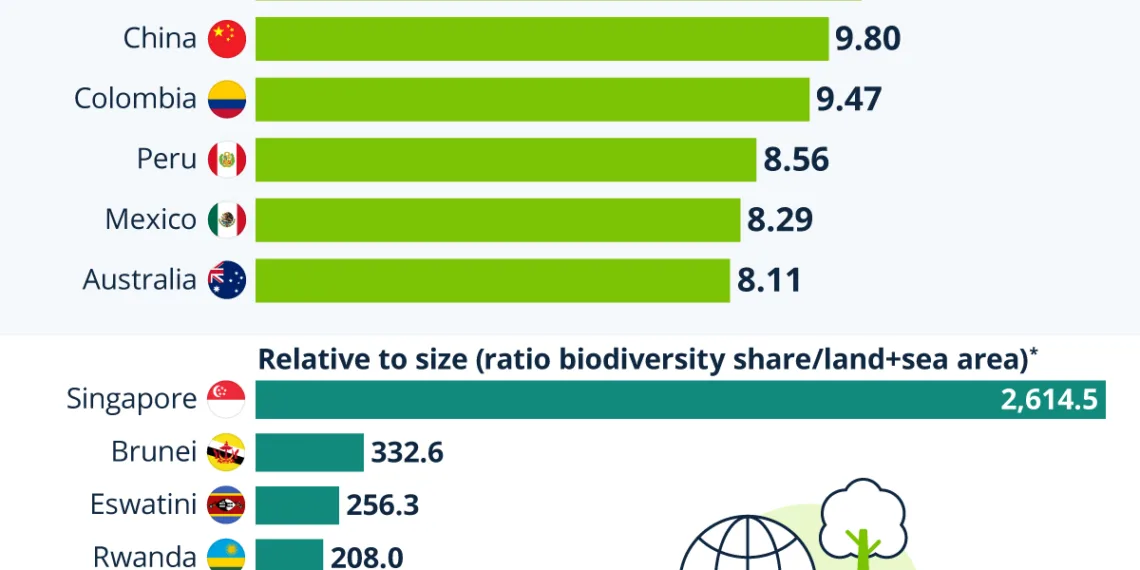Select Language:
Understanding Biodiversity and Its Importance
Biodiversity refers to the variety of life on Earth, encompassing the different species of plants, animals, fungi, and microorganisms, along with their genetic variations and the ecosystems they form. It plays a crucial role in maintaining the functioning of ecosystems, contributing to processes such as nutrient cycling, pollination, and climate regulation. Understanding biodiversity is vital as it supports ecological balance and influences human well-being directly or indirectly.
The Role of Biodiversity in Ecosystems
Biodiversity is critical for various ecosystem functions and services. Here are some of the essential roles it plays:
- Soil Health: A diverse range of organisms contributes to soil fertility by breaking down organic matter and recycling nutrients.
- Pollination: Many plants depend on specific animal species for pollination, making species interactions essential for food production.
- Climate Regulation: Different species have varied roles in regulating local and global climates, affecting everything from temperature to precipitation patterns.
- Resilience to Changes: Biodiverse ecosystems are generally more resilient to disturbances (such as climate change or invasive species) because they contain a variety of species that can respond to changes in different ways.
Threats to Global Biodiversity
Despite its importance, biodiversity is facing unprecedented threats due to several human-induced factors:
Habitat Loss
Urbanization, deforestation, and agricultural expansion are significant drivers of habitat loss, leading to the decline of many species. When ecosystems are fragmented, it often results in isolated populations that struggle to survive.
Invasive Species
Non-native species often outcompete local flora and fauna, disrupting the natural balance of ecosystems. This can lead to declines in native species and, in some cases, their extinction.
Pollution
Air, soil, and water pollution can have devastating effects on biodiversity. Toxic substances can accumulate in the food chain, affecting species survival and reproduction.
Climate Change
Global warming is resulting in habitat shifts and altering species distributions. Many species cannot adapt quickly enough to the rapidly changing climate, leading to potential extinctions.
The Most Biodiverse Countries in the World
Certain countries have emerged as leaders in biodiversity conservation, home to significant shares of the world’s animal and plant species. According to a study by World Rainforests, the following countries stand out:
Brazil
Brazil tops the list with approximately 13% of global species diversity, thanks mainly to its vast Amazon rainforest, which is a rich reservoir of biodiversity.
Indonesia
Boasting numerous islands and various ecosystems, Indonesia ranks high for its unique flora and fauna, contributing extensively to global biodiversity.
China
China’s diverse geography, from mountains to wetlands, supports a wide range of species, making it one of the most biodiverse countries.
Colombia
Interestingly, Colombia, despite its smaller size compared to some of its counterparts, ranks among the top biodiversity hotspots due to its unique climatic and geographical features.
Peru and Mexico
Both of these Latin American countries demonstrate exceptional biodiversity as well, highlighting the richness of ecosystems found in the region.
Biodiversity Concentration in Smaller Countries
While larger nations often house extensive biodiversity, several smaller countries also make significant contributions. Notably:
Singapore
Singapore leads in biodiversity concentration, hosting an impressive variety of species in a small area due to its tropical climate and urban green spaces.
Brunei
Brunei’s rainforests are vital for biodiversity, showcasing an array of endemic species thriving in its tropical environment.
Eswatini, Rwanda, and Burundi
These African countries benefit from tropical latitudes and varied ecosystems, supporting a diverse range of animal and plant species.
Slovenia and Montenegro
In Europe, Slovenia and Montenegro are recognized for their diverse habitats, from alpine regions to Mediterranean coasts, fostering rich biodiversity.
Bhutan
Nestled in the Himalayas, Bhutan boasts a vast array of bird species and unique flora, due to its varied altitudes and climates, securing its place among the world’s most biodiverse nations.
The Importance of Biodiversity Conservation
Preserving biodiversity is critical for sustaining ecosystem services that humanity relies on. It is essential to implement conservation strategies that address the threats facing biodiversity, ensuring a balanced and healthy planet for future generations. This includes promoting sustainable development, protecting habitats, and reducing pollution levels while fostering global cooperation in conservation efforts.
Understanding and protecting these biodiversity hotspots ensures not only the survival of various species but also the health of our planet as a whole.







